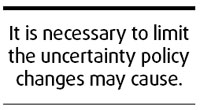Kind cut for investors
(China Daily)
Updated: 2008-04-25 07:27
Updated: 2008-04-25 07:27
The stamp tax cut that took effect yesterday should now bring to an end the hot debate on whether the government should take measures to prop up the stock market.
But the enormous excitement it triggered among investors appears to be too much for policymakers to feel comfortable about.

After tripling it at the end of last May to stop a seemingly unstoppable bullish stock rally then, the authorities announced on Wednesday the cut on tax on the trading of each share back from 0.3 percent to the previous level of 0.1 percent.
Such a belated tax cut would surely give a huge shot in arm to the stock market. The benchmark Shanghai composite stock index just sank below 3,000 points early this week, less than 50 percent of the peak it reached last October. Yesterday, the index jumped by as much as 9.29 percent, the biggest gain in six years.
Clearly, investors have welcomed the tax cut as a long-waited government effort to save slumping markets.
A sharp correction of the stock market was natural and needed. Unchecked rise of share prices would simply be unsustainable.
Yet, a 50-percent plunge the market underwent in the past few months was also not justified by the fundamentals of the Chinese economy and of listed companies. The national economy still expands by more than 10 percent in the first quarter, and enterprises' profit outlook remains solid.
Too volatile fluctuations in share prices hurt not only the interest of most investors but also the healthy development of China's emerging and transitional stock market.
That is why expectations have been mounting in recent weeks on the government taking decisive steps to prop up the domestic markets.
The lowering of stamp duty is an aggressive step the government has taken to prevent investor sentiment from collapsing.
Together with the new trading rules announced last week that prescribed the selling of big amounts of shares to be conducted on a bloc trading system, the reduction in trade cost will considerably boost investors' confidence in the market.
For those who oppose government intervention on the ground that it may mislead investors into ignoring investment risks, the latest tax cut does not necessarily mean a new policy measure to save the market. It can be viewed as a needed reversion to the tax hike the government introduced last May. In the long run, it is necessary to limit the uncertainty such changes of tax policy may cause.
At this moment, however, it looks more urgent to tame investors' overenthusiasm that may spoil the looming recovery.
(China Daily 04/25/2008 page8)
|
||
|
||
|
|
|
|